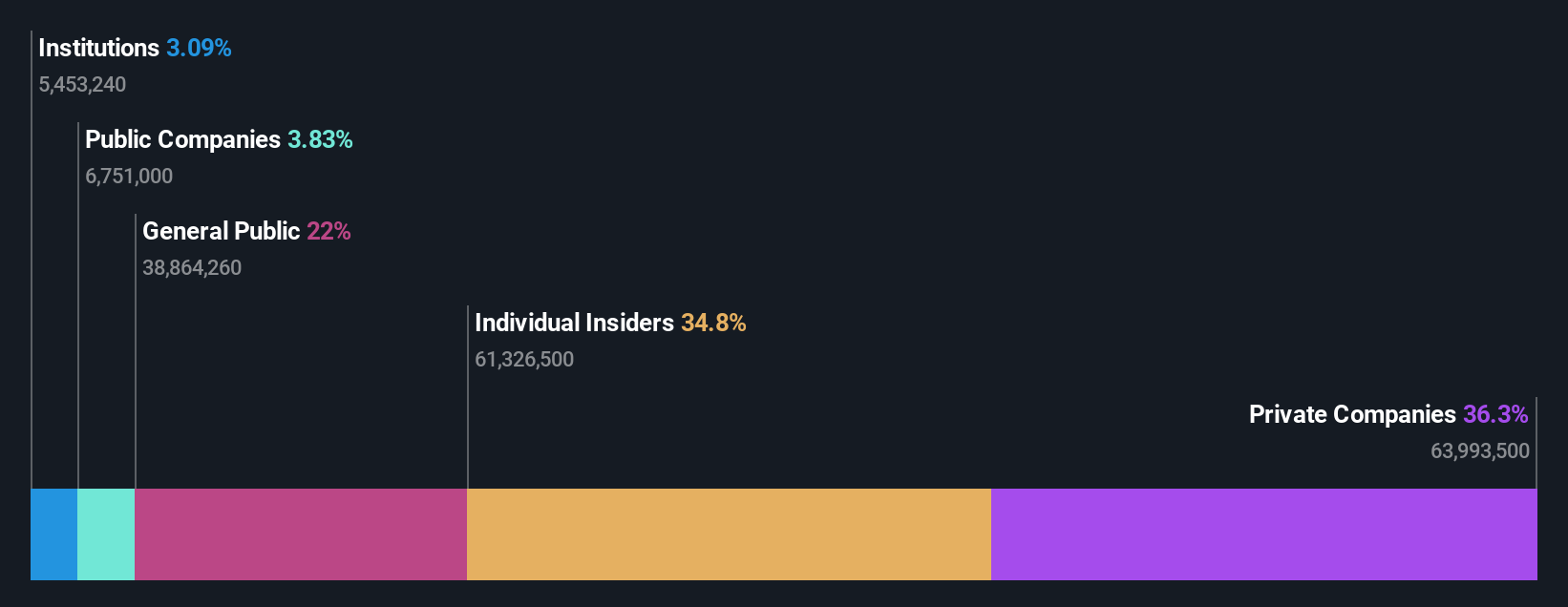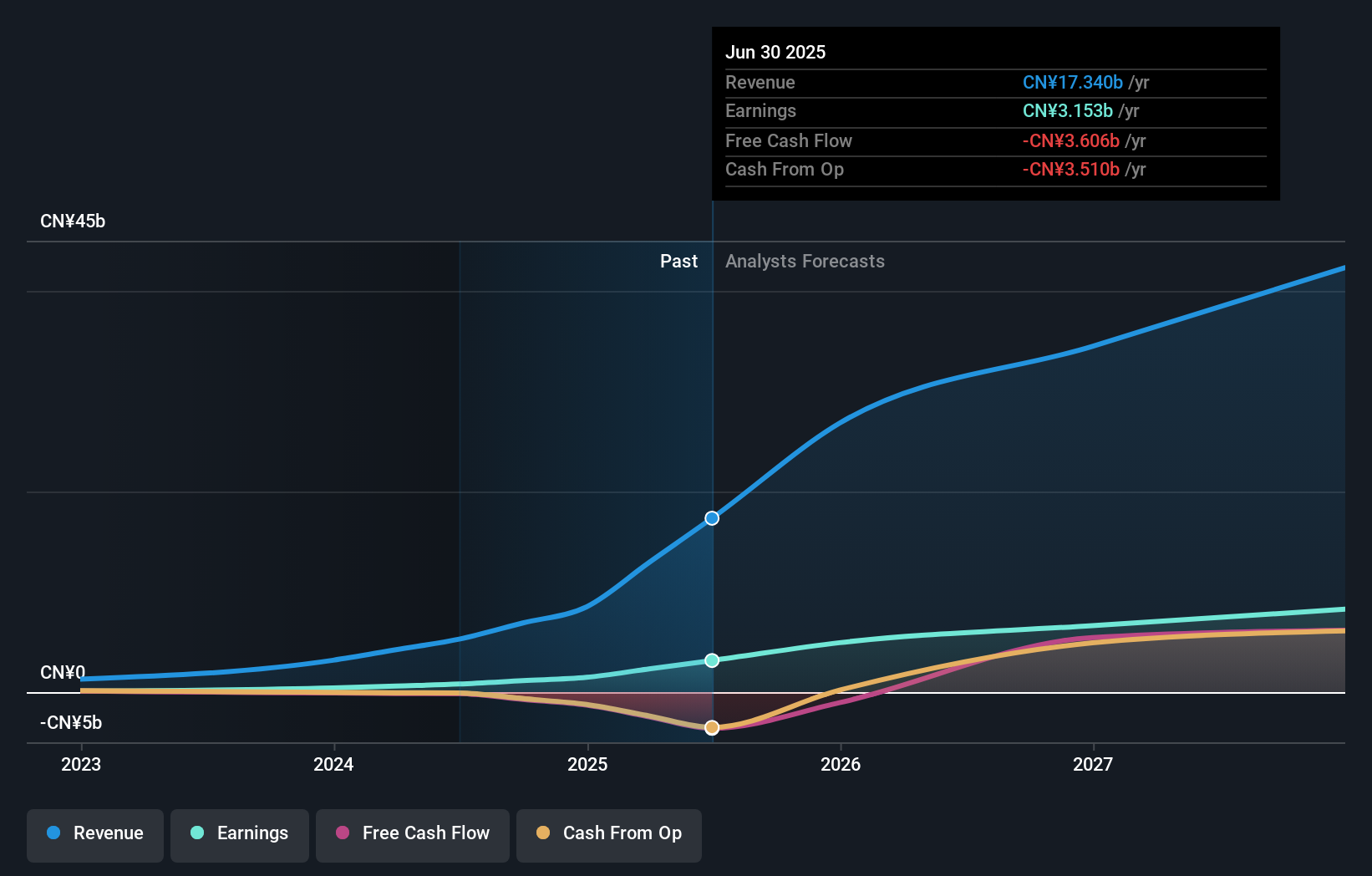Laopu Gold Co., Ltd.'s (HKG:6181) last week's 11% decline must have disappointed private companies who have a significant stake
Key Insights
- The considerable ownership by private companies in Laopu Gold indicates that they collectively have a greater say in management and business strategy
- A total of 3 investors have a majority stake in the company with 58% ownership
- 35% of Laopu Gold is held by insiders
A look at the shareholders of Laopu Gold Co., Ltd. (HKG:6181) can tell us which group is most powerful. With 36% stake, private companies possess the maximum shares in the company. In other words, the group stands to gain the most (or lose the most) from their investment into the company.
Following a 11% decrease in the stock price last week, private companies suffered the most losses, but insiders who own 35% stock also took a hit.
In the chart below, we zoom in on the different ownership groups of Laopu Gold.
See our latest analysis for Laopu Gold

What Does The Institutional Ownership Tell Us About Laopu Gold?
Institutional investors commonly compare their own returns to the returns of a commonly followed index. So they generally do consider buying larger companies that are included in the relevant benchmark index.
Institutions have a very small stake in Laopu Gold. That indicates that the company is on the radar of some funds, but it isn't particularly popular with professional investors at the moment. If the business gets stronger from here, we could see a situation where more institutions are keen to buy. When multiple institutional investors want to buy shares, we often see a rising share price. The past revenue trajectory (shown below) can be an indication of future growth, but there are no guarantees.

Laopu Gold is not owned by hedge funds. Beijing Hongqiao Jinji Consulting Co., Ltd. is currently the largest shareholder, with 32% of shares outstanding. With 18% and 8.5% of the shares outstanding respectively, Gaoming Xu and Guodong Chen are the second and third largest shareholders. Gaoming Xu, who is the second-largest shareholder, also happens to hold the title of Chief Executive Officer.
A more detailed study of the shareholder registry showed us that 3 of the top shareholders have a considerable amount of ownership in the company, via their 58% stake.
Researching institutional ownership is a good way to gauge and filter a stock's expected performance. The same can be achieved by studying analyst sentiments. There are a reasonable number of analysts covering the stock, so it might be useful to find out their aggregate view on the future.
Insider Ownership Of Laopu Gold
While the precise definition of an insider can be subjective, almost everyone considers board members to be insiders. Company management run the business, but the CEO will answer to the board, even if he or she is a member of it.
I generally consider insider ownership to be a good thing. However, on some occasions it makes it more difficult for other shareholders to hold the board accountable for decisions.
Our information suggests that insiders maintain a significant holding in Laopu Gold Co., Ltd.. It is very interesting to see that insiders have a meaningful HK$37b stake in this HK$108b business. It is good to see this level of investment. You can check here to see if those insiders have been buying recently.
General Public Ownership
The general public-- including retail investors -- own 22% stake in the company, and hence can't easily be ignored. While this group can't necessarily call the shots, it can certainly have a real influence on how the company is run.
Private Company Ownership
It seems that Private Companies own 36%, of the Laopu Gold stock. Private companies may be related parties. Sometimes insiders have an interest in a public company through a holding in a private company, rather than in their own capacity as an individual. While it's hard to draw any broad stroke conclusions, it is worth noting as an area for further research.
Public Company Ownership
Public companies currently own 3.8% of Laopu Gold stock. It's hard to say for sure but this suggests they have entwined business interests. This might be a strategic stake, so it's worth watching this space for changes in ownership.
Next Steps:
It's always worth thinking about the different groups who own shares in a company. But to understand Laopu Gold better, we need to consider many other factors. Consider risks, for instance. Every company has them, and we've spotted 1 warning sign for Laopu Gold you should know about.
Ultimately the future is most important. You can access this free report on analyst forecasts for the company.
NB: Figures in this article are calculated using data from the last twelve months, which refer to the 12-month period ending on the last date of the month the financial statement is dated. This may not be consistent with full year annual report figures.
New: AI Stock Screener & Alerts
Our new AI Stock Screener scans the market every day to uncover opportunities.
• Dividend Powerhouses (3%+ Yield)
• Undervalued Small Caps with Insider Buying
• High growth Tech and AI Companies
Or build your own from over 50 metrics.
Have feedback on this article? Concerned about the content? Get in touch with us directly. Alternatively, email editorial-team (at) simplywallst.com.
This article by Simply Wall St is general in nature. We provide commentary based on historical data and analyst forecasts only using an unbiased methodology and our articles are not intended to be financial advice. It does not constitute a recommendation to buy or sell any stock, and does not take account of your objectives, or your financial situation. We aim to bring you long-term focused analysis driven by fundamental data. Note that our analysis may not factor in the latest price-sensitive company announcements or qualitative material. Simply Wall St has no position in any stocks mentioned.
About SEHK:6181
Laopu Gold
Designs, manufactures, and sells jewelry products in Mainland China, Hong Kong, and Macau.
Exceptional growth potential with solid track record.
Market Insights
Community Narratives



